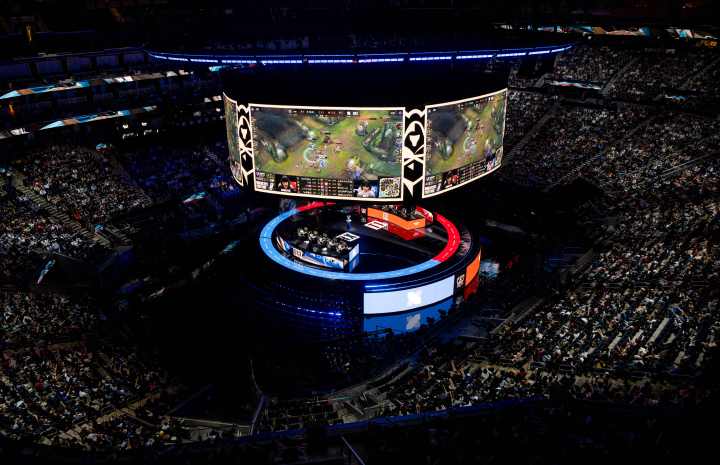
Esports have exploded, but the profits haven’t followed

For the longest time, it has been rumored that esports were of the cusp of something great. “Entertainment of the future” they called it.
This fall, the 2022 League of Legends World Championships averaged roughly 1 million viewers in the U.S., with 5.15 million tuning into the final. But despite the excitement and growth, the industry is still sitting at that cusp, waiting for its moment.
Kellen Browning, a technology reporter for the New York Times, had the opportunity to attend the League of Legends World Championships in San Francisco this past fall and wrote about the business struggles of the burgeoning games.
The following is an edited transcript of their conversation.
Kai Ryssdal: I need you to set the scene for me, the scene with which you start this article we’re going to talk about: It’s the League of Legends Championship in San Francisco.
Kellen Browning: Yeah, it was a huge event. Obviously, this is the World Championship for League of Legends. This is the biggest esport in the world and there were thousands of fans. They sold out Chase Center where the Warriors play. And it was wild. It was the same kind of atmosphere you might expect at a traditional sports game: Fans cheering and clapping and crying when their team lost. So yeah, very exciting.
Ryssdal: And it is literally 50-ish thousand people sitting in this arena watching teams. I guess the teams are playing in real life, and then the spectators are watching on like a jumbotron?
Browning: Yeah, exactly. The teams come out as they’re introduced. They kind of walk up to the this raised platform, where their monitors are set up. On the screen, you can see them looking down at the platform, and then you’re watching their characters on the screen. And people are reacting to that the same way they would to, you know, a Steph Curry bucket or something like that.
Ryssdal: And yet the NBA makes a zillion dollars, and the gist of this article is that, while there is probably going to be money in esports, it ain’t there yet.
Browning: Exactly. There’s so much hype for esports. You know, people think it might be the future of entertainment, especially for young people. But a lot of the investors that have gotten into this space thinking that it would quickly become the next NBA or the next NFL, in terms of revenue, have been a little bit surprised by how long it’s taken to start making money off their investments.
Ryssdal: And you point out in the piece that nobody thought it was going to be an overnight success, but it’s taking way longer than people thought, then the investors thought, and I guess the first question is, how come?
Browning: Yeah, one of the biggest reasons is simply that broadcasting deals in the NFL and the NBA and traditional sports account for a huge proportion of those leagues revenue — billions and billions of dollars. There were some early projections from some of these esports leagues that they would have similar partnerships with YouTube or Twitch, and get a lot of money that way, those haven’t materialized. And another reason is that, unlike in traditional sports leagues, where teams are obviously based in Boston, Miami, San Francisco, and there are teams that build up fan bases in those cities, in many esports — like League of Legends — nearly all the matches are played in one arena in Los Angeles controlled by the company that operates the game. And that sort of made it difficult to develop fanbase appeal and sell jerseys, things like that.
Ryssdal: Say more about the companies that had developed the games. Now I guess, they own the league too. Right?
Browning: Right, exactly. And that’s put them in some cases a bit at odds with the investors because the investors are looking to make money soon. Whereas these companies — for instance, Riot Games, which owns League of Legends — is OK with operating a league that might be losing money for it in the short term, but is bringing a lot of hype and excitement to the actual game of League of Legends, which they can then make money off of. And so, there’s been this bit of an uneasy dance as the investors and the company sort of trying to sort out these different priorities.
Ryssdal: So what do you think? I mean, look, the NBA took, I don’t know, 50 years to get huge. I mean, from George Mikan and Michael Jordan, right? Give or take. Whatever, I’m dating myself. That’s decades.
Browning: And that’s something that many investors and esports team owners mentioned in this piece is, “You know, hey, we’re going to be patient. We’re in this for the long haul. We truly believe that in a couple of decades from now, this will be the future of entertainment.” But I think it’s still a while away. I think there’s still some barriers that need to be overcome first.
There’s a lot happening in the world. Through it all, Marketplace is here for you.
You rely on Marketplace to break down the world’s events and tell you how it affects you in a fact-based, approachable way. We rely on your financial support to keep making that possible.
Your donation today powers the independent journalism that you rely on. For just $5/month, you can help sustain Marketplace so we can keep reporting on the things that matter to you.

















